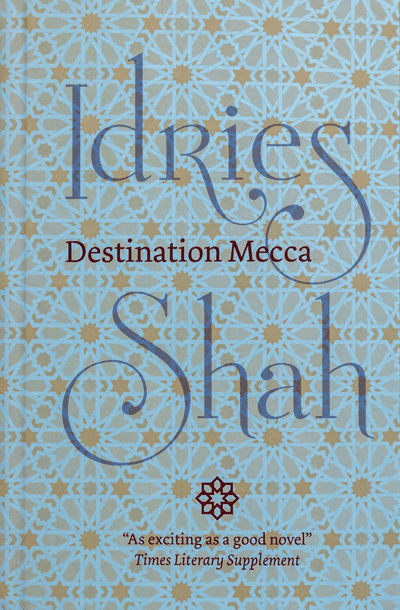First published in 1957, Destination Mecca was both an ambitious Middle East travel memoir and a work of ethnographic and cultural research, taking the reader from Morocco to Saudi Arabia.
Destination Mecca is the Sufi writer Idries Shah’s sweeping classic travelogue through North Africa and the Middle East in the mid-20th century. As an Afghan from a Muslim background, and the son of a roving international diplomat, the author married familiarity with the region with the fresh eye of a traveller, making his account unique among books about the area.
Shah documents a wide range of fascinating journeys: from his quest for King Solomon’s Gold Mines on Sudan’s Red Sea coast, to encounters with Moroccan contraband smugglers, to his time as a personal guest of the elderly King of Saudi Arabia, Ibn Saud. The author’s family connections granted him access that was unavailable to other writers at the time.
Destination Mecca is both an invaluable snapshot of the Arab World, and a rare look at some of the seldom-seen cultural undercurrents running through it.
I Gentleman at Large
II Tangier: Smugglers’ Paradise
III Contraband Runner
IV Eastward to Egypt
V New Arabian Knights
VI Marching Orders
VII Red Sea Journey
VIII The Shrine of the Black Stone
IX Life in Mecca
X Camel Lore
XI Locust Army
XII Audience with Ibn Saud
XIII Saud, Son of Abdul-Aziz
XIV In Search of Solomon’s Mines
XV Mahdism on the March
XVI Domes of Omdurman
XVII Land of the Phoenicians
XVIII Kingdom of the Jordan
XIX Petra the Mysterious
XX The Rock of Paradise
XXI In Search of Venus
XXII Sorcerer’s Apprentice
XXIII Guerrilla King of No Man’s Land
NEW ARABIAN KNIGHTS
A thousand years ago and more, the Caliph Haroun-el-Rashid haunted the streets of imperial Baghdad nightly in disguise, seeking to know the true state of affairs among his people. Readers of the Arabian Nights will recall that in this way many plots against the Throne were discovered,
deserving subjects were eventually rewarded, and the disloyal were rightly chastised, as behoves a well-rounded story.
One of the drawbacks that a traveller and adventurer suffers from when he also writes is that this sine qua non of persuasive fiction is often absent. You either arrive on the scene at the end of the last act, or blunder into something in the middle, and probably get ulcers wondering what the end of the whole thing will be.
Of all places, Cairo gives one that feeling of something either completed (like the Arabisation of the country ten centuries ago) or in the melting-pot – like the Arab League, the Westernisation or the banishing of illiteracy.
Cairo is supposed to be a sink of iniquity, a place of intrigue, plot and counter-plot, headquarters of dope or white slave rings: a thousand and one aspects of shady life and sin. It is easy to talk of these things, easier still to imagine dire deeds and frightful plots amid the medley of rich and poor, mosques and racecourses, palaces and night-clubs, that are the impact upon a casual visitor. But where are these things to be found?
The answer is that, in nine cases out of ten, even if you live in the city for a hundred years, you will not find them. There is one exception to this rule. As with many another thing, like a strange trick of fate, you may stumble across something odder than a hashish-smoker’s dream – when you are not looking for it.
And this is just the reason that I found myself meeting the Great Assassin, Haroun, with four hundred million souls as his potential subjects, and probably a pretty strong case of paranoia.
If you do not believe a word of this story, nobody can blame you. All I can say is that every syllable of it is true and leave it at that.
From Destination Mecca by Idries Shah
Copyright © The Estate of Idries Shah
Idries Shah was born in India in 1924 into an aristocratic Afghan family. He was an author and teacher in the Sufi tradition and is considered one of the leading thinkers of the 20th century.
Shah devoted his life to collecting, translating and adapting key works of Sufi classical literature for the needs of the West. Called by some 'practical philosophy' - these works represent centuries of Sufi and Islamic thought aimed at developing human potential. His best-known works include the seminal book The Sufis, several collections of teaching stories featuring the ‘wise fool’ Nasrudin, Reflections and Knowing How to Know.
Shah's corpus - over three dozen books on topics ranging from psychology and spirituality to travelogues and cultural studies - have been translated into two dozen languages and have sold millions of copies around the world. They are regarded as an important bridge between the cultures of East and West.
UK Paperback
ISBN: 978-1-78479-054-7
Language: English
US Paperback
ISBN: 978-1-78479-057-8
Language: English
UK Hardcover
ISBN: 978-1-78479-929-8
Language: English
US Hardcover
ISBN: 978-1-78479-930-4
Language: English
UK eBook
ISBN: 978-1-78479-056-1
Language: English
US eBook
ISBN: 978-1-78479-059-2
Language: English
UK Kindle
ISBN: 978-1-78479-055-4
Language: English
US Kindle
ISBN: 978-1-78479-058-5
Language: English
Audiobook
ASIN: 1784790575
Language: English
